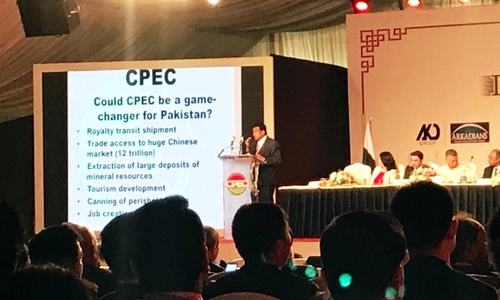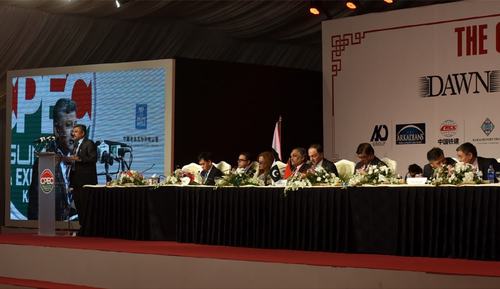KARACHI: International Federation of Freight Forwarders Associations (FIATA) President Babar Badat on Tuesday demanded a separate ministry for the logistics and transport sector for ensuring quick solutions and rapid growth of the industry.
Mr Badat was presiding over the ‘Logistics’ session on the last day of the two-day CPEC Summit and Expo organised by Dawn Media Group in collaboration with the Ministry of Planning, Development and Reforms and Pakistan-China Joint Chamber of Commerce and Industry.
He said that currently the logistics industry had to run from one ministry to another to get the issues resolved. “Once a separate ministry for logistics and transport is formed, the industry will get the work done in the shortest possible time which will allow for faster growth, he said.
Referring to a recent bill presented in the National Assembly on logistics, he said that it does not meet the present day challenges. The bill should be reviewed in consultation with the stakeholders, he stressed.
Pakistan is among the few countries of the world where there is no separate ministry for logistics and transport, he noted. The sector is an important link in the entire supply chain in the region after the launch of the China-Pakistan Economic Corridor (CPEC) and a separate ministry will become a focal point for the industry, he added.
Mr Badat said the Chinese companies should connect with local companies or enter into joint venture to handle transshipment or transit cargoes through Gwadar Port.
Participants at CPEC Summit say industry ready to face challenges
In a similar vein, International Chamber of Commerce Chairman Tariq Rangoonwala also stressed on the need for joint ventures between local and Chinese companies to enhance Pakistan’s industrial base and productivity.
He hoped Pakistan will become a hub for transshipment trade once CPEC is fully on ground. Being a signatory to the TIR Convention, the customs connection on the international transport of goods under the cover of TIR Convention is an important link, he noted.
He disclosed that most of the Customs border posts including Gwadar, Taftan, Chaman, Turkham, Sust and the country’s 12 dry ports are already TIR-compliant. “Any cargo from Iran which has to go to China will move under the cover of this convention,” he added.
The customs posts are already linked electronically through WeBOC and there is no issue of compliance or connectivity under TIR. This will facilitate fast movement of transit and transshipment cargoes across the country.
Karachi Port Trust (KPT) Chairman Rear Admiral Jamil Akhtar said the port has all the potential and infrastructure to supplement CPEC. Presently the cargo handling share of the port has declined up to 60 per cent but the overall volume has increased and annually the port handles around 2.1 million containers, he noted.
Jamil said that after the establishment of Pakistan Deep Water Container Port, it could handle mother ships which presently go to Sallala and Jabal Ali from where feeder services come to Pakistan.
“Karachi port is ideal to serve western parts of China and Central Asian countries,” he added. However, he regretted that there was a missing link between CPEC and KPT.
Under CPEC, KPT could equally play its due role particularly when Pakistan would become a logistical hub and supply chain for South, Central and Western Asia, Middle East and Western China, he summed up.
Chairman Port Qasim Asad Rafi Chandna said the port – being 35km away from downtown – is ideally located for quick movement of cargo from and outside the port. It has strong industrial base and connectivity with major road links to upcountry.
“PQA has already started contributing towards CPEC projects as it houses some of the power plants set-up under the mega project and also coal terminal for supply of imported coal to Sahiwal coal run power plant. The port has become energy hub for the country where two LNG terminals are already operating,” he said.
Speaking on the occasion, Chairman China Overseas Port Holding Company Gwadar Port Zhang Baozhong said the Gwadar Port has already put logistics in place because transport is available, warehouses and customs have also started functioning.
Gwadar is strategically located port on one side is Suez Canal and other Malacca strait, he noted.
The first Free Economic Zone at Gwadar had been developed where more than 40 per cent of investment is Pakistani. Banks, insurance companies, and leasing firms are working in the zone which enjoys tax exemption, he added.
Mr Zhang said that Gwadar port will set up LNG and other terminals.
“Of the 500 people working there, only 13 are Chinese nationals. Out of 500 people, 50 per cent are locals from Balochistan,” he said
CEO Ghandhara Industries Ahmed Kuli Khan said the auto industry is ready to face the Belt and Road initiative (BRI), highlighting that the company could double its capacity in a short period. However, Mr Khan was not happy over the State Bank unwritten policy of not allowing banks to finance the auto industry.
Pakistan needs to modernise its trucking business and transport industry by introducing auto transmission and higher axle load with higher horse power. He further said CPEC is a big opportunity but only those vehicles be allowed to come from China which are not available in the local market.
Chairman TCS Holdings Khalid Awan said that e-commerce and logistics are modern tools which speed up the progress of trade and business activity. E-commerce and logistics are integrated with everyday life of people and become part of people’s life.
CEO TPL Corp Ali Jameel explained how technology can help monitor and regulate CPEC by checking pilferage of goods while in transit and also check if case any truck/vehicle loaded with goods/container deviate from its route. Currently only 60,000 containers move in transit trade but in post CPEC era this number could go into millions.
He further said that the CPEC corridor will go through the Karakoram mountains where geographic terrains are hazardous and presents numerous driving safety challenges but use of technology can also reduce these risks.
Project Director CPEC Hassan Daud said that as per the time line, CPEC projects goal was given by 2020 to take its initial shape thereafter move to industrial activity and then move forward to agriculture which will be completed by 2025 and in 2030 CPEC would be completed and people to people contact will develop.
Published in Dawn, April 25th, 2018














































